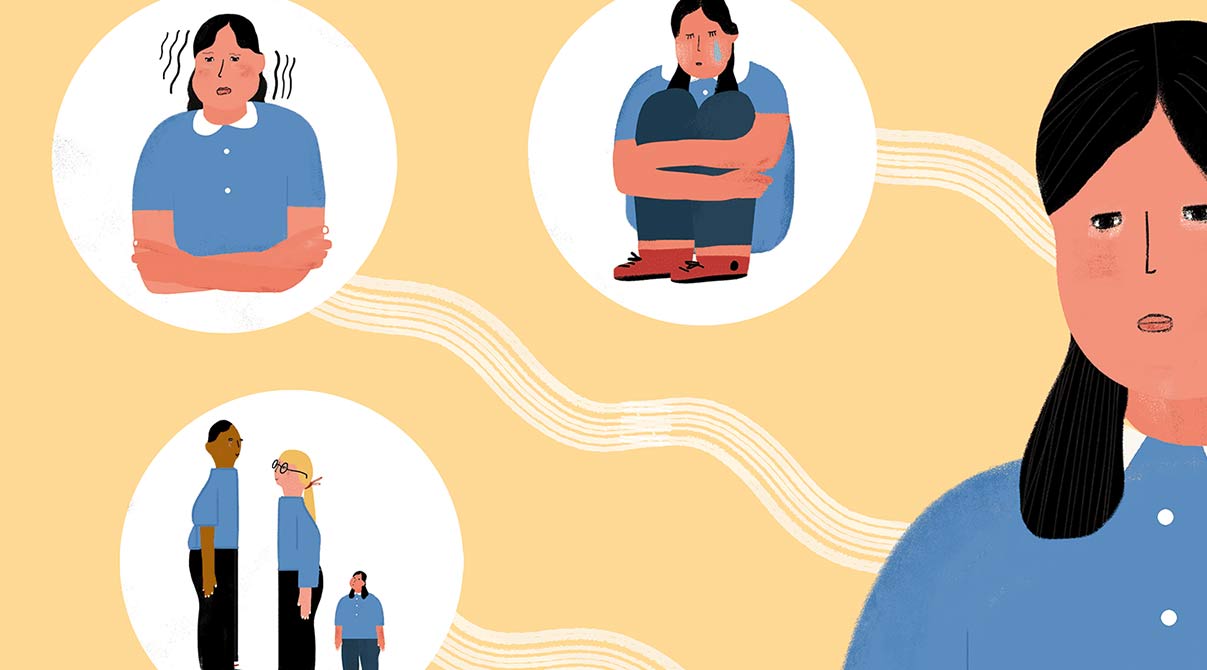Childhood obesity is quietly becoming a serious concern in Pakistan, demanding immediate and urgent action. Obesity is marked by excessive fat accumulation that negatively impacts health. It’s more than just an appearance issue; it’s a grave health problem, notably in children. Recent data show childhood obesity rates in Pakistan are rising sharply.
Children with obesity face immediate health problems, including high cholesterol and high blood pressure, prediabetes, bone and joint issues, sleep apnea, and psychological stress like low self-esteem. The long-term effects are even more concerning. Obese children are likely to become obese adults, putting them at risk for heart disease, type 2 diabetes, and certain cancers.
Addressing childhood obesity is vital for the physical, psychological, and emotional well-being of children. It’s not only about ensuring a healthy childhood but also about securing a future where children can enjoy active, fulfilling lives without the severe effects of obesity. The need to tackle childhood obesity in Pakistan is urgent, requiring a collective effort from all stakeholders.
Childhood Obesity Rate in Pakistan
In 2018, the Pakistan Health Commission’s latest study revealed that over 11% of children in the nation were classified as overweight, with an additional 5% falling into the category of obesity. Nevertheless, deeper investigations through hospital-based studies and surveys present an even graver scenario, indicating that a staggering 40% to 50% of South Asian children are grappling with issues related to excess weight.
Dr. Musarrat Riaz, a specialist at the Institute of Diabetes and Endocrinology, Baqai Medical University Karachi, expressed reservations about the figures provided by the Pakistan Health Commission (PHC) on World Obesity Day. According to Dr. Riaz, who has conducted extensive hospital-based and clinical studies on obesity, the true prevalence is much higher, estimated to be between 40% and 50%.
This escalating trend is leading to health complications and diseases, demanding immediate attention. Experts warn that if current lifestyle patterns persist, the number of children contending with obesity-related problems is poised to surge in the years ahead. Moreover, an alarming number of individuals between the ages of 20 and 25 are now confronting early-onset diabetes, along with hypertension, metabolic syndrome, and a range of hormonal imbalances, all stemming from the universal issue of obesity.
Factors Contributing to Childhood Obesity in Pakistan

Childhood obesity is a multi-layered issue, with various contributing factors intertwining to worsen the problem. Understanding these factors is crucial in devising effective strategies to combat obesity among Pakistani children.
Dietary Habits

A significant portion of the Pakistani children’s diet comprises high-calorie foods, often rich in fats and sugars. Common culprits include deep-fried snacks, sugary beverages, and sweets, which are readily available and popular among kids. The infiltration of Western fast-food culture has also altered dietary patterns, with an increasing preference for burgers, pizzas, and fried chicken, which are high in calories and low in nutritional value.
Furthermore, the consumption of fruits and vegetables is limited, often due to a lack of awareness regarding their importance, coupled with children’s natural tendency to prefer sweet and salty treats over fresh produce.
Lack of Physical Activity

Technological advancements, while beneficial, have inadvertently promoted a sedentary lifestyle among children. The allure of video games, smartphones, and television keeps many glued to screens, limiting their physical activity. Additionally, schools in Pakistan often grapple with challenges like inadequate facilities, lack of trained physical education instructors, and an overwhelming focus on academics, which sidelines physical education, hindering the promotion of an active lifestyle from a young age.
Socioeconomic Status
Economic constraints significantly impact dietary choices in many Pakistani households. Families with limited financial resources often opt for cheaper food options, which unfortunately are usually processed foods high in calories and low in nutrients. The relative affordability and accessibility of unhealthy foods, compared to more expensive fresh produce and lean proteins, inadvertently encourage poor dietary habits, contributing to childhood obesity.
Genetic Factors
Genetics also plays a pivotal role in inclining children to obesity. Some kids have genetic profiles that make them more susceptible to gaining excess weight. However, it’s crucial to acknowledge that genetics alone doesn’t cause obesity. The interplay between genetic tendencies and environmental factors, like dietary habits and physical activity levels, substantially influences the onset and progression of obesity among children. Understanding this interaction can provide valuable insights into developing prevention and treatment strategies for childhood obesity in Pakistan.
Cultural and Environmental Factors

Addressing childhood obesity in Pakistan requires a nuanced understanding of the cultural and environmental factors at play. These factors often silently shape dietary habits and lifestyle choices, significantly influencing the health outcomes of children across the country.
Cultural Influences
The traditional Pakistani diet, characterized by rich, calorie-dense foods, can be both a boon and a bane for children’s nutritional health. While these diets often incorporate a variety of ingredients providing essential nutrients, the method of preparation and the proportion of unhealthy fats and sugars used can tip the scale towards unhealthiness, thereby contributing to obesity.
Additionally, cultural norms and attitudes in some communities may favor a plumper child physique as a sign of health and prosperity, inadvertently discouraging awareness and intervention related to obesity. These deeply embedded perceptions about body weight and image play a pivotal role in shaping families’ responses to childhood obesity, often hindering timely and appropriate action.
Environmental Influences
Environmental factors also substantially influence childhood obesity rates in Pakistan. Many urban areas lack safe and accessible recreational spaces for children to engage in physical activities, limiting their options for exercise and play. Urban planning in many Pakistani cities does not prioritize walkability or provide adequate facilities for physical activity, further reducing children’s opportunities to stay active.
In many neighborhoods, there is limited access to stores offering fresh and healthy food options, making it more challenging for families to adopt and maintain healthy dietary habits. These environmental constraints create an invisible but significant barrier to fostering a healthy lifestyle among children in Pakistan.
Related: Top Digital Health Startups in Pakistan
Media Influence and Marketing Strategies
Media and advertising wield considerable influence over the dietary habits and self-perceptions of children and adolescents in Pakistan. The way foods and body images are presented in media platforms significantly impacts the preferences, choices, and self-esteem of the younger population.
Media Influence on Children
Advertising strategies in Pakistan often glorify high-calorie, low-nutrient foods, making them appealing to children and adolescents. These ads are usually characterized by bright, engaging imagery and messages that associate these unhealthy food options with fun and enjoyment. The omnipresence of these advertisements on television, social media, and other digital platforms makes it challenging for children to make informed, healthy food choices, as they are continuously bombarded with enticing yet unhealthy options.
Additionally, children’s programming and advertising seldom feature diverse body types, reinforcing narrow beauty standards and body ideals. This lack of representation can instill harmful notions of self-worth and body image among children and adolescents, pushing them towards unhealthy dietary practices and eating disorders.
Regulations and Policies
To counter these issues, it’s imperative to regulate food advertising targeting children. Policies should be enacted and strictly enforced to limit the marketing of unhealthy food and beverage products to children. These regulations should encompass all media platforms, ensuring that children are not exposed to misleading food advertisements, irrespective of where they consume media.
Furthermore, media producers and advertisers should take the responsibility to promote positive body image representations. This involves showcasing a diverse range of body types and promoting messages of health, confidence, and self-esteem rather than focusing on appearance. Creating content that encourages children to appreciate and take care of their bodies irrespective of societal beauty standards can contribute to fostering a more accepting and health-focused perspective among the youth in Pakistan.
Health Risks of Childhood Obesity

Childhood obesity is not a benign disorder; instead, it carries significant immediate and long-term health risks. Understanding these risks underscores the importance of proactive measures to prevent and address obesity in the Pakistani youth population.
Immediate Health Risks
Obese children are at a heightened risk of developing high blood pressure and cholesterol levels, even at a very young age. Elevated blood pressure and cholesterol are known precursors to cardiovascular issues, marking the beginning of a perilous health trajectory.
Childhood obesity is also closely linked with an increased risk of developing pre-diabetes or type 2 diabetes, conditions once considered exclusive to adults of Pakistan. The excess fat in the body affects insulin resistance, leading to elevated blood sugar levels. Furthermore, obesity contributes to sleep disorders, including sleep apnea, wherein the child may experience breathing interruptions during sleep. This condition not only leads to poor sleep quality but also affects the child’s overall physical and cognitive development.
Long-Term Health Risks
The health implications of childhood obesity extend into adulthood, with long-lasting effects on cardiovascular health being predominant concerns. Obese children are more likely to grow into obese adults, and thus, are at a greater risk of developing heart diseases later in life due to the early onset of high cholesterol and blood pressure. Obesity also places undue stress on joints, and over time, this can result in chronic pain and arthritis, limiting mobility and affecting the quality of life.
Beyond the evident physical risks, childhood obesity is intricately linked with mental health challenges. Children who are obese often grapple with low self-esteem, depression, and anxiety due to societal pressures and stigmatization, which can adversely affect their emotional and psychological well-being, extending well into their adult lives.
Psychological and Social Impact of Childhood Obesity

Childhood obesity doesn’t only have physical consequences; it profoundly impacts a child’s psychological and social well-being. Understanding these implications is crucial to holistically address and mitigate the adverse effects of obesity on Pakistani children.
Psychological Effects
Childhood obesity often serves as a catalyst for plummeting self-esteem and negative body image perceptions amongst children. When children continually confront societal standards of beauty and fitness, those who are obese often develop feelings of worthlessness and dissatisfaction with their physical appearance.
This disconcerting self-view not only hampers their self-confidence but also paves the way for severe mental health conditions like depression and anxiety. The psychological toll of obesity can create a vicious cycle, wherein the stress and sadness further worsen unhealthy eating habits, thus intensifying the problem.
Social Effects
The societal lens often unfairly stigmatizes obesity, leading to widespread bullying and exclusion for obese children. This stigmatization creates an emotionally toxic environment where peers, and sometimes even adults, might isolate or ridicule obese children.
Such negative interactions significantly impair the social development of these children, pushing them into further isolation and discouragement from participating in group activities, whether in academic or recreational settings. This enforced solitude not only deprives them of essential life experiences but also fosters feelings of loneliness and social anxiety, which can have long-lasting implications on their social lives and overall happiness.
Related: Top Health Insurance Companies in Pakistan
How to Prevent Childhood Obesity?

In the urgent mission to combat childhood obesity in Pakistan, fostering awareness is a pivotal first step. Thoughtful and targeted initiatives can ripple through communities, influencing healthier choices and lifestyles. These include:
School-Based Interventions
With schools being a pivotal environment where children spend a significant part of their day, they play a crucial role in shaping students’ attitudes and habits related to health and nutrition. Implementing school-based interventions is fundamental in creating a supportive atmosphere that promotes healthy lifestyle choices among children.
Curriculum Integration
Incorporating nutrition education into the curriculum serves as a foundational step towards fostering health-conscious individuals. Strategies could include dedicated nutrition classes, integrating nutrition-related topics into science or health courses, and organizing interactive workshops or seminars led by nutrition experts. This education should not just be theoretical; it should actively engage students in understanding and applying nutritional knowledge in their daily lives.
Similarly, the physical education programs need a robust enhancement. Schools should not only allocate sufficient time for physical activities but also diversify the range of exercises, games, and sports offered to students, ensuring they are engaging and inclusive for all students regardless of their fitness levels.
School Environment
Creating an environment that supports learned healthy habits is essential. Schools should consider providing meals that are balanced and nutritious, ensuring they comply with dietary guidelines and are appealing to students. The introduction of salad bars, fruit stations, and the inclusion of various protein sources can contribute to a more balanced diet. Additionally, schools should revisit the kinds of snacks and beverages available in their premises.
Promoting healthier alternatives, like replacing sugary drinks with water or fruit juices and offering nuts, fruits, or low-calorie snacks instead of chips and candies, can significantly shift consumption patterns towards healthier options, thus reducing childhood obesity. Educational campaigns within the school can also play a role in encouraging students to make healthier food and drink choices.
Parental Support and Education

Parents play an instrumental role in children’s development, serving as the primary influencers of their attitudes, habits, and perceptions related to health and body image. Providing support and education for parents is imperative in crafting a home environment that encourages and nurtures healthy living and positive self-esteem among children.
Parental Education
Empowering parents with accurate information and practical strategies about childhood obesity is crucial in Pakistan. Resources can include online platforms, community health centers, and school-based seminars providing guidance on balanced nutrition and healthy eating habits. Parents should be educated on the importance of offering a variety of foods, practicing portion control, and leading by example through their dietary choices.
Fostering a positive environment at home where body image is concerned is vital. Parents should avoid making negative comments about their child’s or their body weight and instead focus on promoting health, strength, and vitality. Implementing family discussions about body positivity and self-acceptance can also contribute to building a supportive atmosphere at home.
Creating a Supportive Home Environment
A home that champions healthy living provides a strong foundation for children to develop good habits. Parents should consider keeping plenty of fruits, vegetables, and whole foods available while limiting the supply of sugary snacks and processed foods. Engaging children in meal planning and preparation activities can also encourage a greater appreciation and understanding of nutritious foods.
Physical activity should be seamlessly integrated into family routines, whether through scheduled exercise times, family walks, bike rides, or active games. Creating opportunities for the family to stay active together not only promotes health but also strengthens family bonds.
Introducing Professional Development Programs

Addressing childhood obesity efficiently requires the continuous education and professional development of those at the frontline of children’s health and education. Healthcare providers and teachers in Pakistan need updated knowledge and tools to support children and their families in preventing and managing obesity effectively.
Healthcare Provider Training
Training healthcare professionals to adeptly handle childhood obesity is paramount. This training should focus on equipping providers with the skills to identify obesity early, communicate sensitively with families, and offer appropriate intervention and support.
Resources might include workshops, seminars, online courses, and educational materials focused on the latest research and best practices related to childhood obesity. Providers should also have access to tools such as BMI calculators, dietary guidelines, and exercise recommendations that help them guide families in managing childhood obesity, including nutritional guidelines, physical activity recommendations, and psychological support resources.
Teacher Training
Teachers play a pivotal role in promoting healthy lifestyles among children, making their training essential. Strategies for teacher training in Pakistan should encompass the integration of nutrition and physical activity into the classroom, identification of obesity-related issues among students, and the promotion of a body-positive environment in schools.
Workshops, conferences, and online professional development courses can provide teachers with the necessary knowledge and skills. Additionally, collaboration with healthcare professionals can offer teachers valuable insights and support in addressing childhood obesity effectively within the school environment. Online platforms, government-led initiatives, and NGO programs can offer these essential training opportunities to teachers across Pakistan.
Proactive Steps to Prevent Childhood Obesity in Pakistan

As we have explored, childhood obesity is not merely a health concern; its implications extend to the psychological and social realms, deeply affecting the lives of children both in the short and long term. Through collective effort, awareness, education, and action, we can pave the way for a healthier, more positive future for the children of Pakistan, enabling them to lead fulfilling lives unburdened by the myriad challenges associated with obesity. Together, let’s take proactive steps towards fostering a culture of health, well-being, and inclusivity for every child in our country.